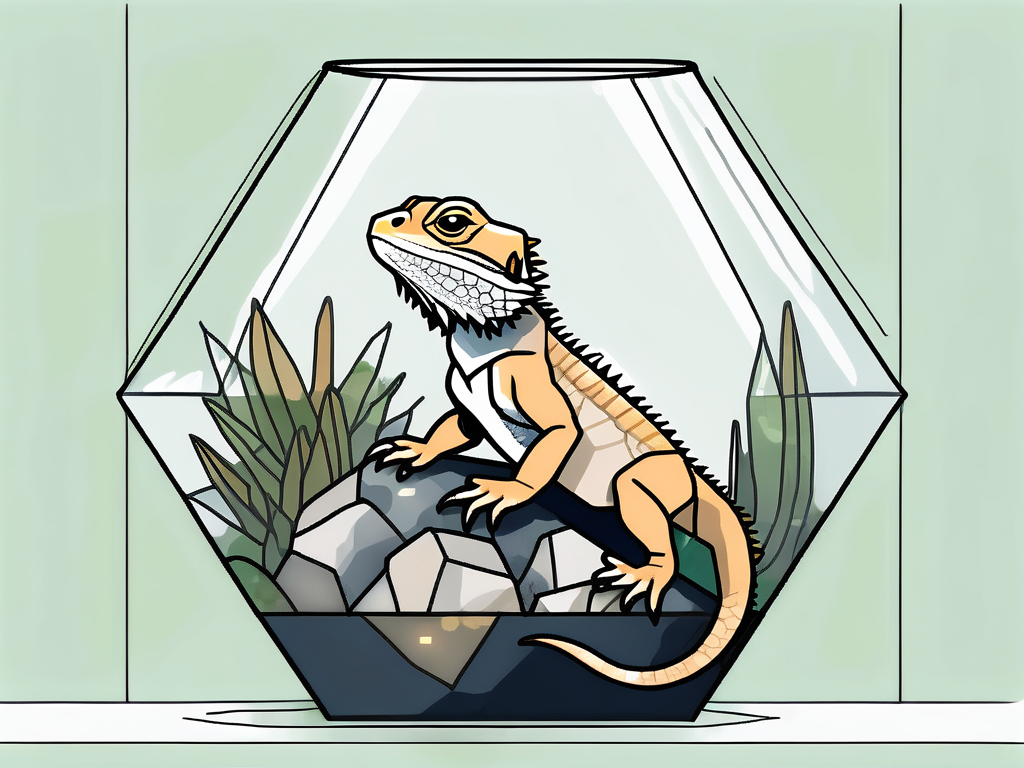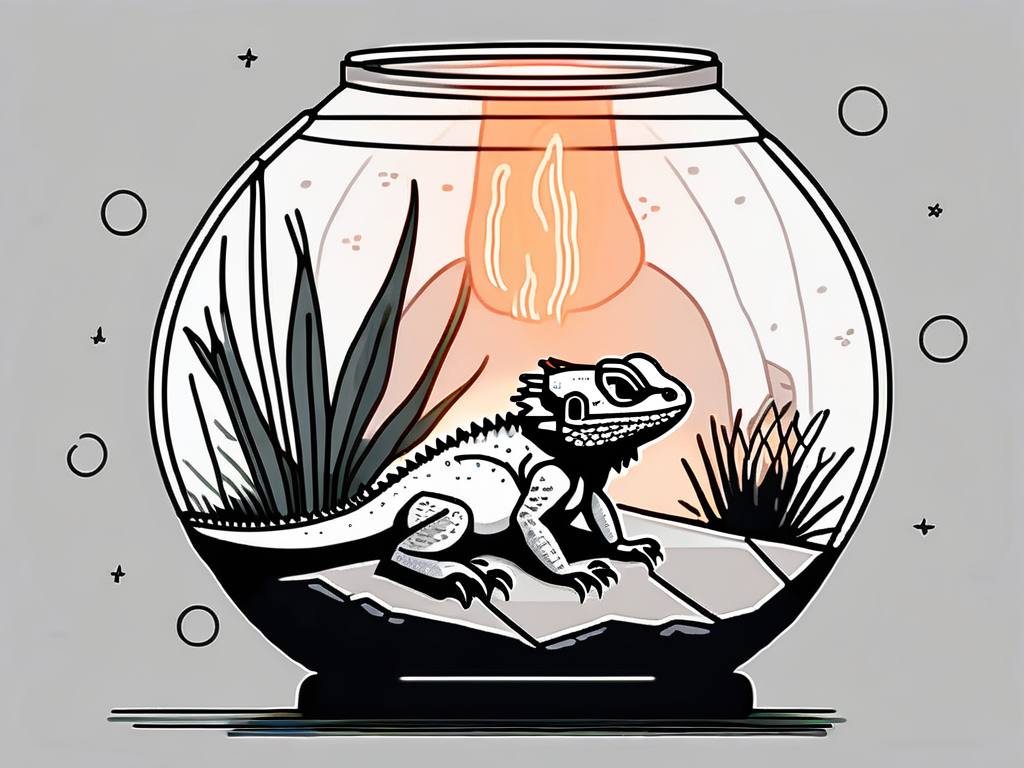As a responsible pet owner, it is crucial to understand the needs and requirements of your bearded dragon. One topic of concern that often arises is whether or not these reptiles can survive the night without any lights. In this article, we will explore the various aspects of a bearded dragon’s natural habitat, the impact of light on their well-being, and the debate surrounding whether or not to leave lights on at night. We will also provide valuable tips for creating an ideal sleep environment for your bearded dragon.
Understanding Bearded Dragon’s Natural Habitat
Before delving into the specifics of lighting requirements, it is essential to understand the natural habitat of bearded dragons. These reptiles originate from the arid regions of Australia, where they bask in the sun and seek shelter to regulate their body temperature.

Bearded dragons are known to inhabit a variety of landscapes within Australia, ranging from deserts and arid scrublands to Eucalyptus forests. Within these habitats, they have adapted to blend in with their surroundings, utilizing their coloration as camouflage against predators and prey alike. Their ability to regulate body temperature by moving between sunny basking spots and cooler shaded areas is crucial for their survival in these harsh environments.
The Day-Night Cycle in a Bearded Dragon’s Life
A bearded dragon’s natural day-night cycle plays a vital role in their overall well-being. In the wild, they experience a regular schedule of bright daylight followed by darkness during the night. This regular rhythm helps them maintain their internal clock and supports necessary physiological functions.
During the day, bearded dragons engage in activities such as basking, foraging for food, and establishing territories. As the sun sets, they seek shelter in burrows or under rocks to rest and conserve energy. This diurnal lifestyle has shaped their behavior and biology, making them highly adapted to the rhythms of their natural environment.
Temperature Requirements for Bearded Dragons
Temperature is another critical aspect of a bearded dragon’s environment. These reptiles are ectothermic, meaning they rely on external sources to regulate their body temperature. The correct temperature gradient is crucial for their digestion, metabolism, and overall health.
Bearded dragons thermoregulate by moving between warmer and cooler areas in their habitat. Providing a gradient of temperatures in their enclosure allows them to self-regulate and choose the optimal temperature for various activities. This behavior mirrors their natural instincts in the wild, where they seek out different microclimates to maintain their body temperature within the ideal range for digestion and other physiological processes.
The Impact of Light on Bearded Dragons
Lighting has a significant impact on the well-being of bearded dragons. In particular, both UV light and darkness play distinct roles in their health and behavior.
The Role of UV Light in Bearded Dragon’s Health
UV light, specifically UVB rays, is essential for bearded dragons as it enables the synthesis of vitamin D3, which is crucial for calcium absorption. This, in turn, supports strong bones and overall growth. Adequate exposure to UVB light is essential for their long-term health and vitality.
How Darkness Affects Bearded Dragons
While bearded dragons need bright light during the day, darkness is equally important during the night. Darkness allows them to rest, sleep, and recharge. It also provides a break from constant exposure to light, which can be stressful for these reptiles.
Furthermore, the natural day-night cycle is crucial for maintaining the circadian rhythm of bearded dragons. Just like humans, these creatures have an internal body clock that regulates various physiological processes. The presence of darkness at night helps synchronize their internal clock, ensuring they have a proper sleep-wake cycle.
During the night, bearded dragons exhibit different behaviors compared to daytime activities. They may find a comfortable spot to rest, adjust their body temperature, or engage in subtle movements to find the perfect sleeping position. This period of rest is vital for their overall well-being and allows them to conserve energy for the following day’s activities.
The Debate: Lights On or Off at Night?
The question of whether to leave lights on or turn them off at night is a matter of heated debate among bearded dragon owners. Each approach has its own set of pros and cons that should be carefully considered.

Bearded dragons, like many reptiles, rely on external cues such as light and temperature to regulate their biological functions. The debate over lights on or off at night stems from the need to balance their natural instincts with captive living conditions.
Pros and Cons of Leaving the Lights On
Leaving the lights on at night can provide a sense of security for bearded dragons. It can also prevent sudden disturbances caused by power outages or other unforeseen events. However, prolonged exposure to light at night may disrupt their natural day-night cycle and potentially disrupt their sleep patterns.
Some owners argue that providing a consistent source of light at night can help simulate the moonlight that bearded dragons would experience in the wild. This can create a more natural environment for them and potentially reduce stress levels. On the other hand, excessive light exposure during the night can lead to behavioral issues and impact their overall well-being.
Pros and Cons of Turning the Lights Off
Turning the lights off at night allows bearded dragons to experience natural darkness, which is vital for their health and rejuvenation. This darkness can promote restful sleep and allow them to fully recharge for the next day. However, sudden changes in lighting conditions can cause stress and anxiety for these reptiles.
Some owners opt to mimic the natural day-night cycle by providing a gradual dimming of lights in the evening to simulate dusk, followed by complete darkness during the night. This approach aims to strike a balance between providing a period of restful darkness while minimizing the stress of abrupt changes in lighting. Finding the right balance between light and dark is crucial in ensuring the well-being of bearded dragons in captivity.
Tips for Creating an Ideal Sleep Environment for Bearded Dragons
Creating an ideal sleep environment for your bearded dragon is crucial to ensure their overall well-being and promote a healthy day-night cycle. Here are some valuable tips to consider:
Choosing the Right Light Bulbs
When selecting light bulbs for your bearded dragon’s habitat, opt for a full-spectrum UVB light that mimics natural sunlight. This will provide the necessary UVB rays and promote vitamin D3 synthesis. Use a separate basking light to create a temperature gradient in their enclosure.
Setting Up a Proper Temperature Gradient
Ensure that your bearded dragon’s enclosure has a proper temperature gradient, with a basking spot that reaches around 95-105°F (35-40°C) and cooler areas that range from 75-85°F (24-29°C). This temperature variation allows them to regulate their body temperature effectively.
Providing Adequate Humidity Levels
Bearded dragons require a certain level of humidity to support their respiratory health and hydration. Aim for a humidity level of around 30-40% in their enclosure, which can be achieved by misting their habitat lightly once or twice a day. Avoid excessive humidity, as it can lead to respiratory issues and skin problems.
Creating Hiding Spots and Climbing Structures
Offering hiding spots and climbing structures in your bearded dragon’s habitat is essential for their mental stimulation and physical exercise. Rocks, branches, and artificial caves provide opportunities for them to explore, climb, and feel secure. These enrichments mimic their natural environment and promote overall well-being.
Frequently Asked Questions About Bearded Dragon’s Night Routine
Here are answers to some commonly asked questions regarding a bearded dragon’s night routine:

How Long Should Bearded Dragons Sleep?
Bearded dragons typically sleep around 8-12 hours per night. However, it is normal for them to remain inactive during the day as well, as they are naturally more active during the early morning and evening hours.
Can Bearded Dragons See in the Dark?
While bearded dragons can see in low-light conditions, they do not possess night vision capabilities like some other nocturnal animals. Providing them with a period of darkness at night allows them to alleviate stress and engage in natural sleeping patterns.
It’s important to note that the sleeping patterns of bearded dragons can be influenced by various factors, including age, health, and environmental conditions. Younger dragons and those recovering from illness may require more sleep, while older dragons may be more active during the day and sleep longer at night.
Additionally, the sleeping habits of bearded dragons in the wild may differ from those in captivity. In their natural habitat, bearded dragons may adjust their sleeping patterns based on factors such as temperature, food availability, and predators. When kept as pets, providing a consistent light and dark cycle can help mimic their natural environment and promote healthy sleep.
In conclusion, whether your bearded dragon will survive the night without lights depends on their natural habitat and specific lighting requirements. Understanding the impact of light on their health, the pros and cons of leaving lights on or off, and creating an ideal sleep environment will help ensure their overall well-being. By providing them with the proper lighting and temperature conditions, you can ensure that your bearded dragon enjoys sound sleep and thrives in their habitat.
